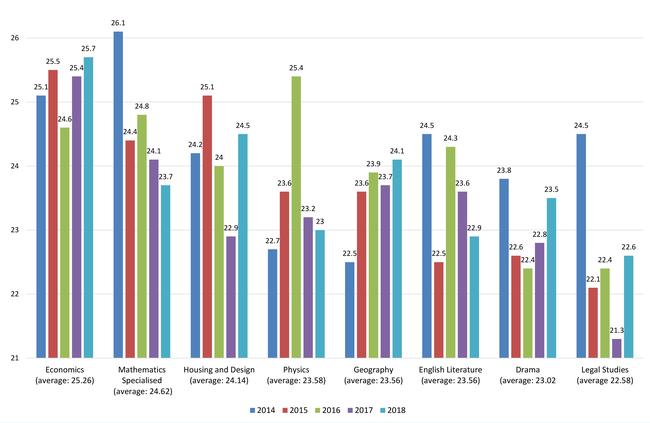TCE: Which subjects to choose for a top score
THE final two years of high school is crunch time for students trying to achieve marks for entrance into university courses. But which subjects should they choose? Here are the top scoring subjects.

Tasmania
Don't miss out on the headlines from Tasmania. Followed categories will be added to My News.
THE final two years of high school is crunch time for students trying to achieve marks for entrance into university courses. But which subjects should they choose?
If you don’t like maths or economics think again, because they’re among the highest scoring TASC subjects over the past five years.
Although points are not determined until the end of the school year when exams are completed, many students may feel the need to choose subjects based on how high they usually score.
The highest scoring subjects from the past five years are as follows: (average score between 2014 and 2018 for students who achieve exceptional achievement (EA) mark)
Economics — 25.26
Mathematics Specialised — 24.62
Housing and Design — 24.14
Physics — 23.58
Geography — 23.56
English Literature — 23.56
Drama — 23.02
Legal Studies — 22.58
Mathematics Methods — 22.56

Careers Adviser at Guilford Young College Richard Clark said that when choosing subjects it is a more complicated process than simply looking at past scores.
“The advice I give about subject selection is tailored to the individual student and depends entirely upon their circumstances,” he said.
“So the advice I give regarding subject selection, even for two students with the same intended career pathway may be different.”
However, Mr Clark said that if a student has a high interest in something but may not do so well in it, he sometimes advises them to choose something they’re better at.
“A student with a passion for music, but with a low aptitude, may instead need to select a subject that has greater potential to yield a higher score according to their strengths.” Mr Clark said.
TASC (Tasmanian Assessment Standards and Certification) executive officer Katrina Beams said students should not rely on past scores.
“Students are not encouraged to select courses in anticipation of the points they may be allocated based on previous scaling results, however, some students may use previous scaling outcomes to inform their course selection.”
Course counsellor and deputy head of years 11 and 12 at the Friends’ School Lyn Tunbridge said she also advises students to take past scores with a grain of salt.
“I tell the students you can’t predict the points, so I always say it would be a bad decision to be basing their choice on last year’s information,” she said.
Ms Tunbridge said students should look at what they plan to do after year 12 in order to cover any prerequisites and then to look at what they’re genuinely interested in and what their strengths are.


